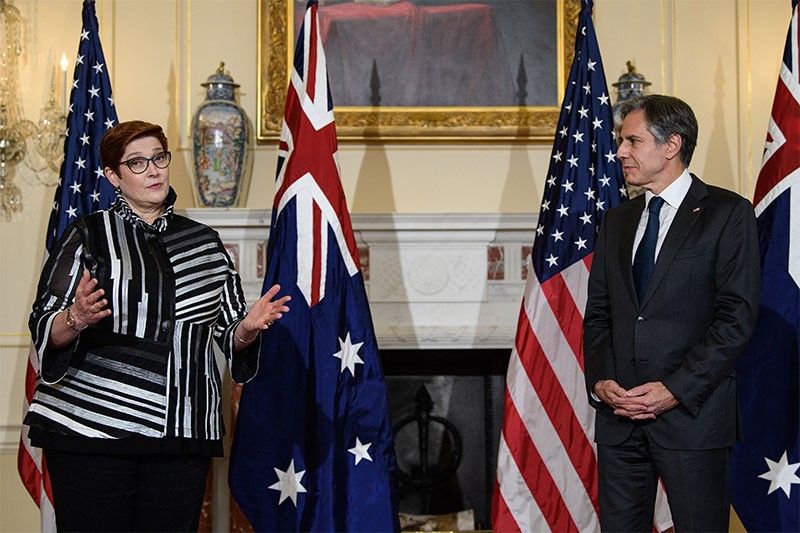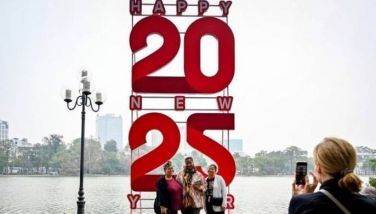Australia to get nuclear subs in new US, British partnership

WASHINGTON, United States — The United States, responding to growing rivalry from China, announced a new alliance Wednesday with Australia and Britain to strengthen naval capabilities in the Indo-Pacific with a new Australian nuclear submarine fleet.
The announcement — made in a video meeting by President Joe Biden, Australian Prime Minister Scott Morrison and his British counterpart Boris Johnson — was sure to infuriate France, which has been negotiating a multi-billion-dollar sale of conventional submarines to Australia.
France's Naval Group voiced its "deep disappointment" at news of the initiative which appeared to pull the rug out from under the French-Australian deal.
Biden said the work to enable Australia to build nuclear-powered submarines would ensure that they had "the most modern capabilities we need to maneuver and defend against rapidly evolving threats."
The submarines, stressed Biden and the other leaders, will not be nuclear armed, only powered with nuclear reactors.
The three leaders did not mention China in unveiling the partnership, dubbed AUKUS, but their intent was clear.
"Our world is becoming more complex, especially here in our region, the Indo-Pacific. This affects us all. The future of the Indo-Pacific will impact all our futures," Morrison said.
Johnson said they would work "hand in glove to preserve stability and security in the Indo-Pacific."
Technical and naval representatives from the three countries will spend the next 18 months deciding how to carry out Australia's upgrade, which Johnson said would be "one of the most complex and technically demanding projects in the world, lasting for decades."
In addition to the submarine fleet, a senior Biden administration official said AUKUS will combine forces on "cyber, AI — particularly applied AI, quantum technologies and some undersea capabilities as well."
The Biden administration official underlined repeatedly how "unique" the decision is, with Britain being the only other country the United States has ever helped to build a nuclear fleet.
"This technology is extremely sensitive," the official said. "We view this as a one-off."
Stealth and interoperability
With China building up its own navy and repeatedly testing decades of US military dominance across Asia, the creation of AUKUS, with its focus on submarines, is "meant to send a message of reassurance and a determination to maintain a strong deterrent stance," the US official said.
Even if not carrying nuclear weapons, the new submarines will allow Australia to "play at a much higher level," the official said.
"Nuclear powered submarines really maintain superior characteristics of stealth, speed, maneuverability, survivability and really substantial endurance," the official said.
"You will see much deeper interoperability along our navies and our nuclear infrastructure," the official said. "This is a fundamental decision, fundamental. It binds Australia... and the United States and Great Britain for generations. This is the biggest strategic step that Australia's taken in generations."
French deal in peril
Biden, in an attempt to placate Paris, said France is a "key partner and ally" in the Indo-Pacific.
But there appeared to be dim prospects for France's conventional submarine deal, which was worth around AUS$50 billion (31 billion euros, 36.5 billion dollars) to France and had been personally backed by President Emmanuel Macron.
France's Naval Group agreed to build 12 conventional Attack Class subs, but the order is already years behind schedule, well over budget and has become tangled in Australian domestic politics.
As recently as June, Macron promised "full and complete" commitment to the deal. A top Australian defense official said around the same time, however, that Australia was actively considering alternatives.
Australian officials said then that the potential plan B was classified but indicated the issue had been taken more seriously in recent months and included submarines and other vessels.
The AUKUS announcement comes as Australia has been boosting defense spending in response to China's more assertive posture.
Morrison will join Biden again on September 24, this time in person, at a first White House gathering of the "Quad" diplomatic group — Australia, India, Japan and the United States.
- Latest
- Trending
































